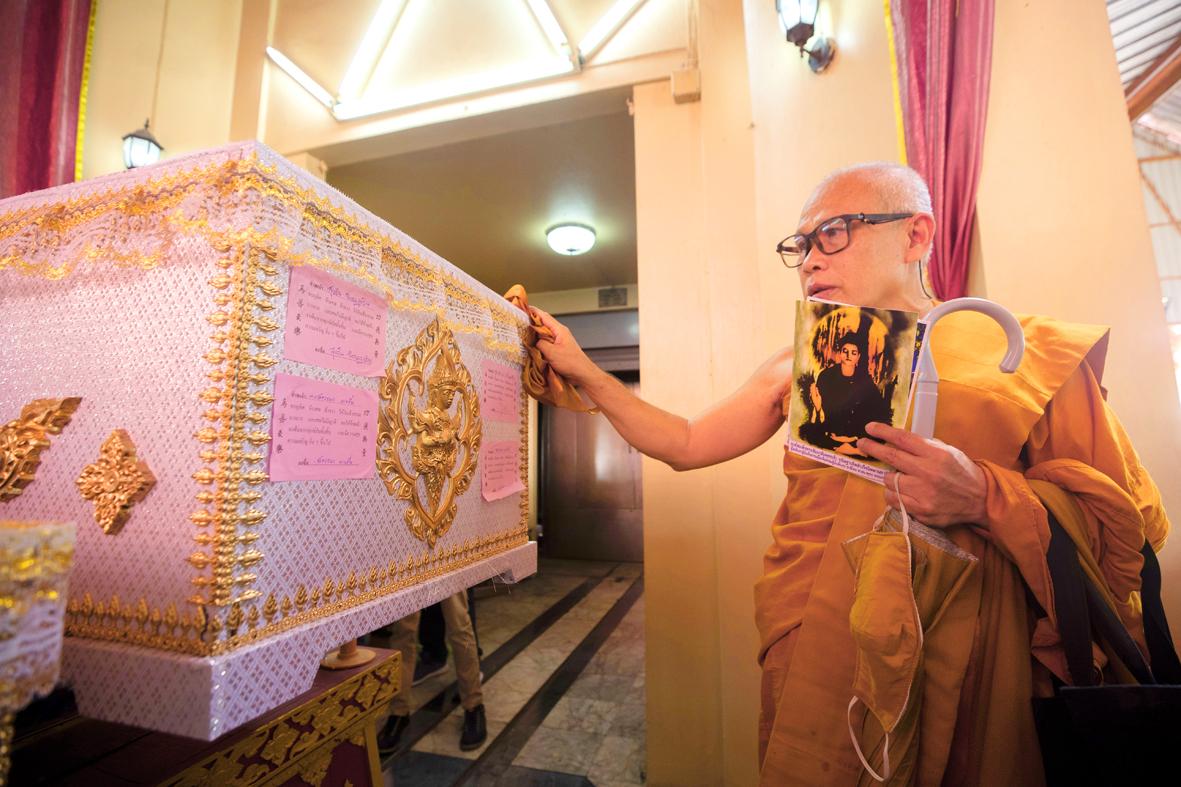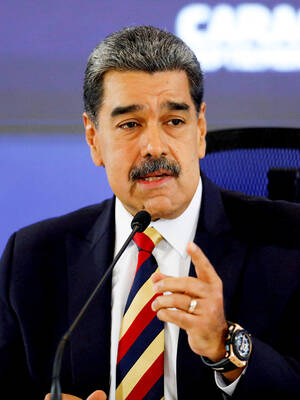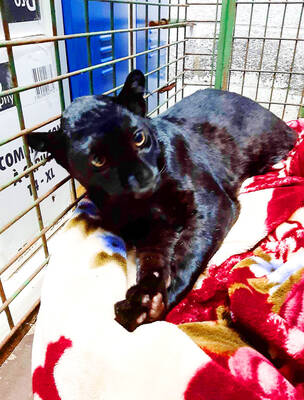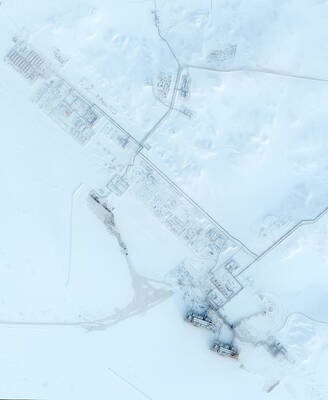For decades, some Thai parents warned their naughty children that if they did not behave, Si Ouey would eat their livers.
If the threat of a ghostly visit from the executed child killer, long called a cannibal, proved ineffective, those children could always be taken to see Si Ouey. After all, his mummified corpse, gnarled and blackened, for years stood on display in a glass case in the Forensic Museum at Bangkok’s Siriraj Hospital.
However, in recent years doubts were raised about whether the man called Thailand’s first serial killer was given justice and a campaign was launched to at least give him a proper funeral.

Photo: AP
On Thursday, six decades after his execution, that finally happened.
Nine Buddhist monks at a temple north of Bangkok chanted prayers and paper flowers were placed in front of Si Ouey’s coffin, which was then moved to the crematorium, where the head of the Thai Department of Corrections lit the fire. Hospital officials as well as residents of a town where he once lived looked on.
Si Ouey, a Chinese immigrant who worked as a gardener, was reportedly caught red-handed in 1958 in a forest in Rayong province burning the body of an eight-year-old boy who had disappeared on an errand.
Police were quick to pin on him at least five previous unsolved murders of children dating back to 1954, some in other provinces. Lurid newspaper accounts detailed how he supposedly relished eating their hearts, livers and intestines.
Si Ouey was said to have told police that he acquired a taste for human flesh during World War II, when as a Chinese soldier in a unit besieged by the Japanese he survived by eating the bodies of those killed in battle.
He was tried and found guilty of murder and executed by firing squad on Sept. 16, 1959. He was 32.
His body was then handed over to Siriraj Hospital for what was described as medical study. His story soon became a regular staple of horror books and B-movies.
However, the truth about Si Ouey’s case is difficult to confirm. Police at the time had a reputation for beating confessions out of suspects and popular newspapers dished out tabloid-style sensationalism.
Si Ouey was also at a disadvantage because he was a poor immigrant, arriving from China in 1946 at age 19.
Thailand’s military governments at the time was keen to stir up anti-Chinese sentiment in the Cold War atmosphere and often blamed immigrants for crime and unrest.
Doubts about Si Ouey’s guilt only garnered much interest in the past decade, after several television documentaries pointed out discrepancies in the evidence, such as one of his victims still having her organs despite Si Ouey’s confessing to eating them.
Pharaoh Chakkraphattranan, who heard the warnings about Si Ouey as a boy, saw one of those programs and it led him in 2018 to start an online petition asking that Si Ouey no longer be labeled a cannibal and that he be given a proper funeral.
“I went back to that museum and I felt different looking at him,” Pharaoh said. “Before I just thought I was looking at a man-eater, now I see a victim who was stripped of his rights and dignity. Whether or not he committed the crime, his body shouldn’t be displayed in the glass box.”
Siriraj Hospital reviewed the matter last year, removed the sign on his display case calling him a “cannibal” in June last year and then withdrew his body from public view in August last year. Officials finally announced this month that he would be cremated.
Wannapa Thongchin, whose parents employed Si Ouey, also embraced the cause and along with other residents of the town where he once lived lobbied for a proper funeral.
She said that her parents always told her that Si Ouey was innocent.
“Even though he was not our family member, we counted him as one,” Wannapa said on Thursday at Si Ouey’s funeral. “Villagers spoke of him as a good person. It made me feel sorry for him. It was as if he was being tormented, so we had to find a way to bring him out from the glass box.”

VENEZUELAN ACTION: Marco Rubio said that previous US interdiction efforts have not stemmed the flow of illicit drugs into the US and that ‘blowing them up’ would US President Donald Trump on Wednesday justified a lethal military strike that his administration said was carried out a day earlier against a Venezuelan gang as a necessary effort by the US to send a message to Latin American cartels. Asked why the military did not instead interdict the vessel and capture those on board, Trump said that the operation would cause drug smugglers to think twice about trying to move drugs into the US. “There was massive amounts of drugs coming into our country to kill a lot of people and everybody fully understands that,” Trump said while hosting Polish President

Japan yesterday heralded the coming-of-age of Japanese Prince Hisahito with an elaborate ceremony at the Imperial Palace, where a succession crisis is brewing. The nephew of Japanese Emperor Naruhito, Hisahito received a black silk-and-lacquer crown at the ceremony, which marks the beginning of his royal adult life. “Thank you very much for bestowing the crown today at the coming-of-age ceremony,” Hisahito said. “I will fulfill my duties, being aware of my responsibilities as an adult member of the imperial family.” Although the emperor has a daughter — Princess Aiko — the 23-year-old has been sidelined by the royal family’s male-only

A French couple kept Louise, a playful black panther, in an apartment in northern France, triggering panic when she was spotted roaming nearby rooftops. The pair were were handed suspended jail sentences on Thursday for illegally keeping a wild animal, despite protesting that they saw Louise as their baby. The ruling follows a September 2019 incident when the months-old feline was seen roaming a rooftop in Armentieres after slipping out of the couple’s window. Authorities captured the panther by sedating her with anesthetic darts after she entered a home. No injuries were reported during the animal’s time on the loose. The court in the

Another tanker carrying liquefied natural gas from Russia’s sanctioned Arctic LNG (liquefied natural gas) 2 project has docked in a Chinese port, ship-tracking data showed, days after Russian President Vladimir Putin met Chinese President Xi Jinping (習近平) in Beijing. The London Stock Exchange Group (LSEG) tracking data indicated the Russian Voskhod LNG tanker was anchored at an LNG terminal in the port of Tieshan in Guangxi, China. The Russian flagged tanker, with a cargo of 150,000 cubic meters of LNG, was loaded up at the Arctic LNG 2 facility in Gydan in northern Siberia on July 19, LSEG data showed.